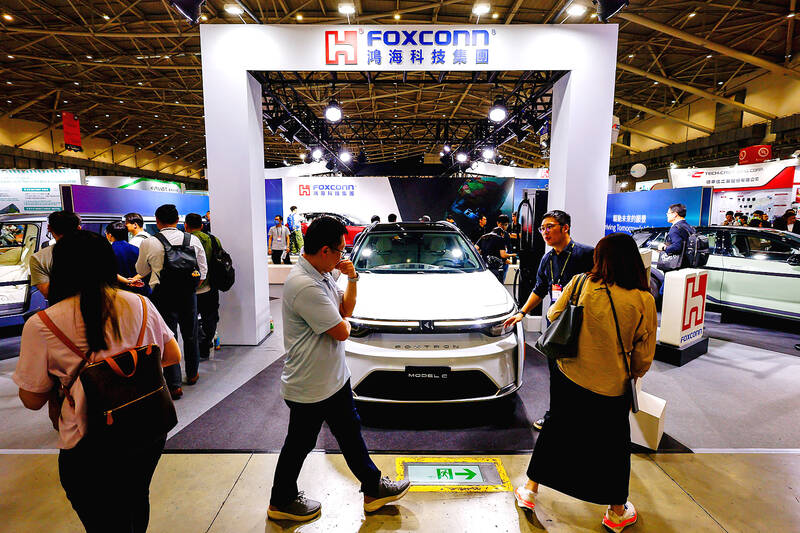Hon Hai Precision Industry Co (鴻海精密), the main contract manufacturer for Apple Inc and Nvidia Corp, yesterday said its revenue last month rose 25.5 percent year-on-year, likely boosted by the hastening of orders ahead of US tariffs that could upend business for its customers.
Hon Hai, also known as Foxconn Technology Group (富士康科技集團), said consolidated sales reached NT$641.37 billion (US$21.28 billion), up from NT$510.9 billion a year earlier.
That contributed to Hon Hai’s best ever total for the first four months of the year — up 24.58 percent to NT$2.28 trillion, the company said in a statement, crediting “strong pull-in momentum” for things such as artificial intelligence products.

Photo: Ann Wang, Reuters
It came on the heels of a first quarter in which Apple and PC makers such as Lenovo Group Ltd (聯想) accelerated shipments to the US and other markets to stockpile inventory.
Even with those pre-emptive measures, Hon Hai customers are expected to take a hit from US tariffs on China and elsewhere. On Thursday last week, Apple said during its quarterly earnings call that it expects US$900 million in higher costs from tariffs in the current period.
Hon Hai said it anticipates quarterly and year-on-year growth in this quarter, adding that the impact of evolving global political and economic conditions would require close monitoring. It has scheduled its first-quarter earnings report and call for Wednesday next week.
Separately, Largan Precision Co (大立光) yesterday reported revenue of NT$4.37 billion for last month, up 26.53 percent from a year earlier, which was in line with the company’s expectations.
The smartphone camera lens supplier’s cumulative sales in the first four months were NT$18.95 billion, up 28.32 percent from a year earlier, Largan said in a separate statement.
The company said sales last month grew for the fifth consecutive month on an annual basis, but shipment momentum this month is expected to slow from last month.
In addition, Largan said that the strengthening of the New Taiwan dollar against the US dollar is not good for its operations, without elaborating.
Additional reporting by staff writer

NEW IDENTITY: Known for its software, India has expanded into hardware, with its semiconductor industry growing from US$38bn in 2023 to US$45bn to US$50bn India on Saturday inaugurated its first semiconductor assembly and test facility, a milestone in the government’s push to reduce dependence on foreign chipmakers and stake a claim in a sector dominated by China. Indian Prime Minister Narendra Modi opened US firm Micron Technology Inc’s semiconductor assembly, test and packaging unit in his home state of Gujarat, hailing the “dawn of a new era” for India’s technology ambitions. “When young Indians look back in the future, they will see this decade as the turning point in our tech future,” Modi told the event, which was broadcast on his YouTube channel. The plant would convert

‘SEISMIC SHIFT’: The researcher forecast there would be about 1.1 billion mobile shipments this year, down from 1.26 billion the prior year and erasing years of gains The global smartphone market is expected to contract 12.9 percent this year due to the unprecedented memorychip shortage, marking “a crisis like no other,” researcher International Data Corp (IDC) said. The new forecast, a dramatic revision down from earlier estimates, gives the latest accounting of the ongoing memory crunch that is affecting every corner of the electronics industry. The demand for advanced memory to power artificial intelligence (AI) tasks has drained global supply until well into next year and jeopardizes the business model of many smartphone makers. IDC forecast about 1.1 billion mobile shipments this year, down from 1.26 billion the prior

People stand in a Pokemon store in Tokyo on Thursday. One of the world highest-grossing franchises is celebrated its 30th anniversary yesterday.

Zimbabwe’s ban on raw lithium exports is forcing Chinese miners to rethink their strategy, speeding up plans to process the metal locally instead of shipping it to China’s vast rechargeable battery industry. The country is Africa’s largest lithium producer and has one of the world’s largest reserves, according to the US Geological Survey (USGS). Zimbabwe already banned the export of lithium ore in 2022 and last year announced it would halt exports of lithium concentrates from January next year. However, on Wednesday it imposed the ban with immediate effect, leaving unclear what the lithium mining sector would do in the